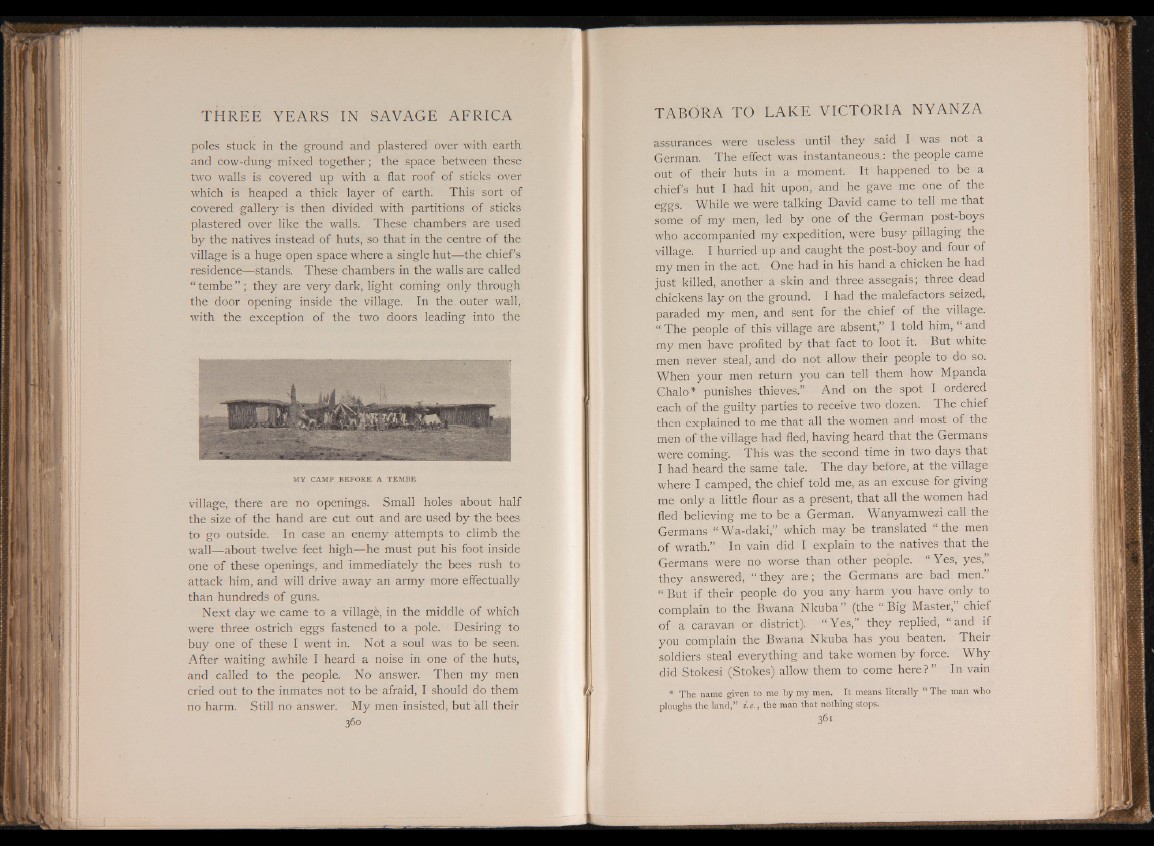
poles stuck in the ground and plastered over with earth
and cow-dung mixed together; the space between these
two walls is covered up with a flat roof of sticks over
which is heaped a thick layer of earth. This sort of
covered gallery is then divided with partitions of sticks
plastered over like the walls. These chambers are used
by the natives instead of huts, so that in the centre of the
village is a huge open space where a single hut—the chiefs
residence-B-stands. These chambers in the walls are called
“ tembe ” ; they are very dark, light coming only through
the door opening inside the village. In the. outer wall,
with the exception of the two doors leading into the
MY CAMP BEFORE A TEMBE
village, there are no openings. Small holes about half
the size of the hand are cut out and are used by the bees
to go outside. In ease an enemy attempts to climb the
wall—about twelve feet high—he must put his foot inside
one of these openings, and immediately the bees rush to
attack him, and will drive away an army more effectually
than hundreds of guns.
Next day we came to a village, in the middle of which
were three ostrich eggs fastened to a pole. Desiring to
buy one of these I went in. Not a soul was to be seen.
After waiting awhile I heard a noise in one of the huts,
and called to the people. No answer. Then my men
cried out to the inmates not to be afraid, I should do them
no harm. Still no answer. My men insisted, but all their
360
assurances were useless until they said I was not a
German. The effect was instantaneous,.: the people came
out of their huts in a moment. It happened to be a
chiefs hut I had hit upon, and he gave me one of the
eggs. While we were talking David came to tell me that
some of my men, led by one of the German post-boys
who accompanied my expedition, were busy pillaging the
village. I hurried up and caught the post-boy and four of
my men in the act. One had in his hand a chicken he had
just killed, another a skin and three assegais; three dead
chickens lay on the ground. I had the malefactors seized,
paraded my men, and sent for the chief of the village.
“ The people of this village are absent,” I told him, “ and
my men have profited by that fact to loot it. But white
men never steal, and do not allow their people to do so.
When your men return you can tell them how Mpanda
Chalo* punishes thieves.” And on the spot I ordered
each of the guilty parties to receive two dozen. The chief
then explained to me that all the women and most of the
men of the village had fled, having heard that the Germans-
were coming. This was the second time in two days that
I had heard the same tale. The day before, at the village
where I camped, the chief told me, as an excuse for giving
me only a little flour as a present, that all the women had
fled believing me to be a German. Wanyamwezi call the
Germans “Wa-daki,” which may be translated “ the men
of wrath.” In vain did I explain to the natives that the
Germans were no worse than other people. Yes, yes,
they answered, “ they are; the Germans are bad men.”
“ But if their people do you any harm you have only to
complain to the Bwana Nkuba” (the “ Big Master,” chief
of a caravan or district). “ Yes,” they replied, “ and if
you complain the Bwana Nkuba has you beaten. Their
soldiers steal everything and take women by force. Why
did Stokesi (Stokes) allow them to come here ? ” In vain
* The name given to me by my men. It means literally “ The man who
ploughs the land,” i.e., the man that nothing stops.
361